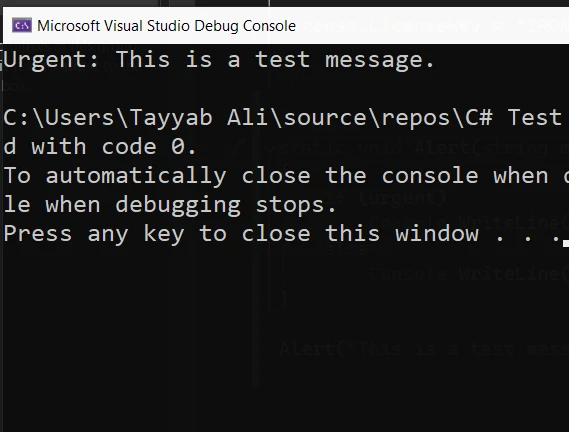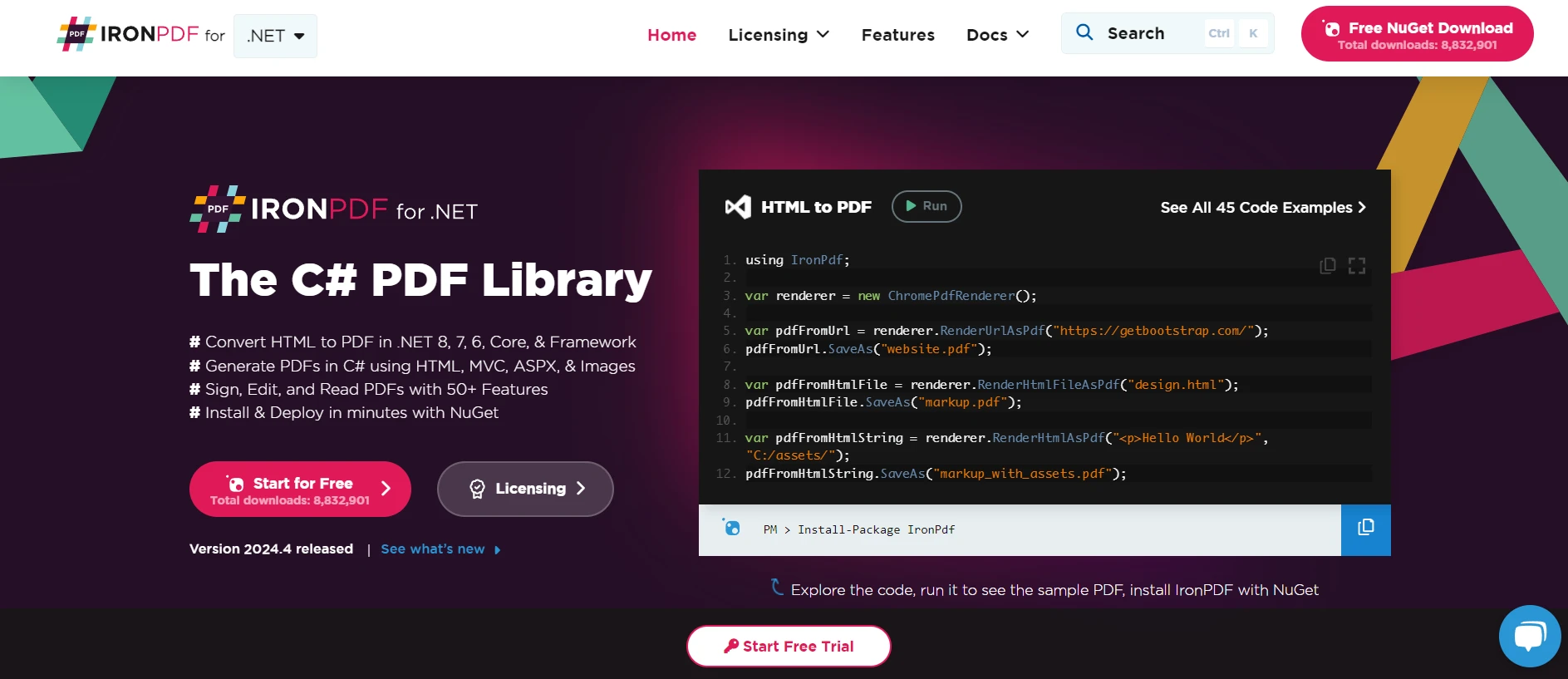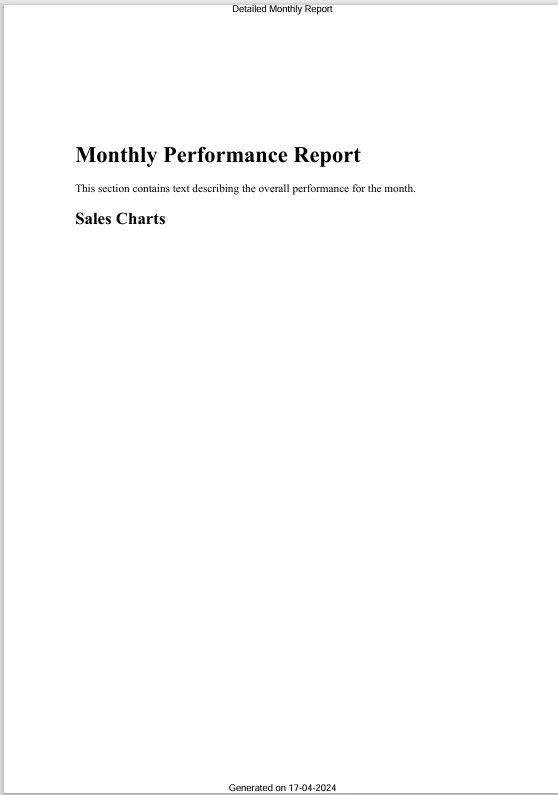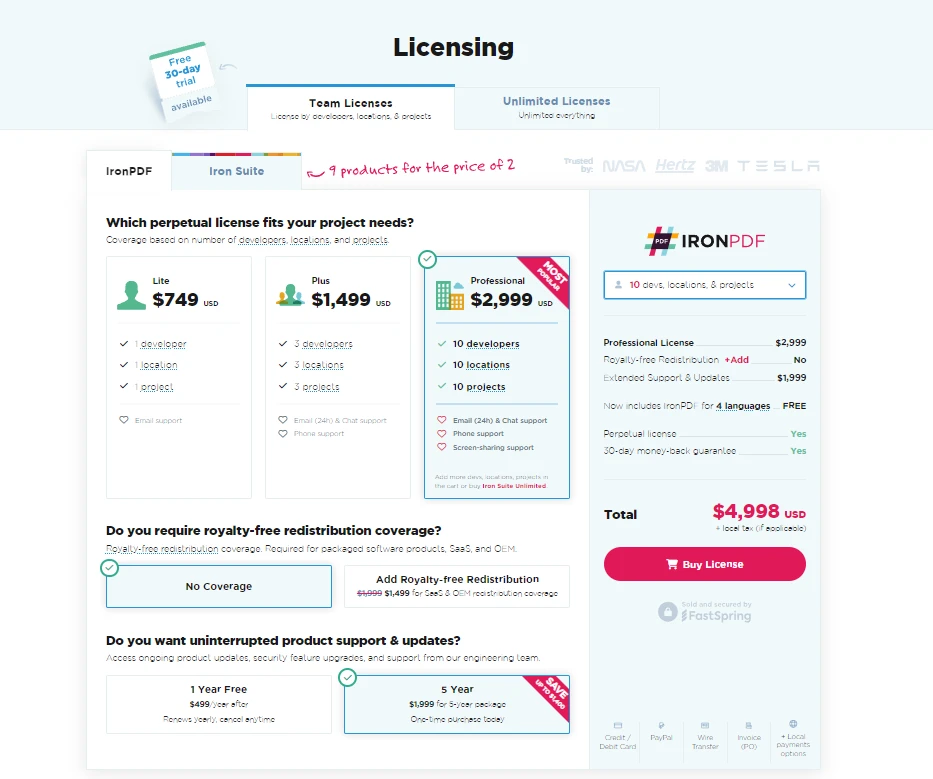C# 可选参数(开发人员如何使用)
在C#中定义可选参数
基本语法
要定义一个可选参数,您需要在方法声明中为其指定一个默认值。 这个默认值必须是一个常量表达式。 以下是如何在方法定义中为一个或多个可选默认参数定义方法:
public static void DisplayGreeting(string message, string end = "!")
{
Console.WriteLine(message + end);
}public static void DisplayGreeting(string message, string end = "!")
{
Console.WriteLine(message + end);
}在上述代码片段中,'end'是一个带有默认参数值'!'的可选参数。 这允许方法在不提供第二个参数的情况下被调用。
使用可选参数的调用方法
以下是调用上述方法的两种方式:
static void Main()
{
DisplayGreeting("Hello"); // Outputs: Hello!
DisplayGreeting("Hello", "?"); // Outputs: Hello?
}static void Main()
{
DisplayGreeting("Hello"); // Outputs: Hello!
DisplayGreeting("Hello", "?"); // Outputs: Hello?
}第一次调用省略第二个参数,使用默认值。 第二次调用提供了一个特定值,覆盖了默认值。
利用命名参数和可选参数
C#中的命名和可选参数增强了涉及可选参数的方法调用的清晰度。 它们允许在调用中通过命名直接指定哪些参数被赋值。
使用命名参数的示例
// Named parameters
public static void ConfigureDevice(string deviceName, bool enableLogging = false, int timeout = 30)
{
Console.WriteLine($"Configuring {deviceName}: Logging={(enableLogging ? "On" : "Off")}, Timeout={timeout}s");
}// Named parameters
public static void ConfigureDevice(string deviceName, bool enableLogging = false, int timeout = 30)
{
Console.WriteLine($"Configuring {deviceName}: Logging={(enableLogging ? "On" : "Off")}, Timeout={timeout}s");
}您可以使用命名参数指定顺序错误的值或跳过可选参数。
static void Main()
{
ConfigureDevice("Router", timeout: 60);
}static void Main()
{
ConfigureDevice("Router", timeout: 60);
}这个调用使用一个可选参数来指定超时的值,同时使用enableLogging的默认值。
结合固定参数和可选参数
方法可以同时有必要参数(固定参数)和可选参数。 必要参数必须始终在方法声明中位于可选参数之前,如以下代码片段所示。
代码示例
public static void CreateProfile(string firstName, string lastName, int age = 25, string city = "Unknown")
{
Console.WriteLine($"Name: {firstName} {lastName}, Age: {age}, City: {city}");
}public static void CreateProfile(string firstName, string lastName, int age = 25, string city = "Unknown")
{
Console.WriteLine($"Name: {firstName} {lastName}, Age: {age}, City: {city}");
}调用方法
static void Main()
{
CreateProfile("John", "Doe"); // Uses default age and city
CreateProfile("Jane", "Doe", 30, "New York"); // Specifies all parameters
}static void Main()
{
CreateProfile("John", "Doe"); // Uses default age and city
CreateProfile("Jane", "Doe", 30, "New York"); // Specifies all parameters
}这种省略参数的灵活性允许在不同上下文中使用相同的方法,而无需多个重载。
默认值必须是常量表达式
可选参数的默认参数必须是常量表达式,它们在编译时评估。这确保了默认值始终稳定且可预测。
正确使用默认值
public static void SendEmail(string address, string subject = "No Subject", string body = "")
{
Console.WriteLine($"Sending email to {address}\nSubject: {subject}\nBody: {body}");
}public static void SendEmail(string address, string subject = "No Subject", string body = "")
{
Console.WriteLine($"Sending email to {address}\nSubject: {subject}\nBody: {body}");
}重载与可选参数
而方法重载涉及为不同的用例创建多个方法签名,使用可选参数允许单个方法处理各种场景。
通过代码进行比较
重载方法可能看起来像这样:
// Method overloading
public static void Alert(string message)
{
Console.WriteLine(message);
}
public static void Alert(string message, bool urgent)
{
if (urgent)
Console.WriteLine("Urgent: " + message);
else
Console.WriteLine(message);
}// Method overloading
public static void Alert(string message)
{
Console.WriteLine(message);
}
public static void Alert(string message, bool urgent)
{
if (urgent)
Console.WriteLine("Urgent: " + message);
else
Console.WriteLine(message);
}使用可选参数的等效方法:
public static void Alert(string message, bool urgent = false)
{
if (urgent)
Console.WriteLine("Urgent: " + message);
else
Console.WriteLine(message);
}public static void Alert(string message, bool urgent = false)
{
if (urgent)
Console.WriteLine("Urgent: " + message);
else
Console.WriteLine(message);
}
使用可选参数的好处
可选参数简化了方法接口,并减少了过多重载的需要。 它们使方法更灵活,并且代码库更容易维护和理解。
可选参数的挑战
如果使用过多,可选参数可能导致对每个方法期望和正确执行所需内容的混淆。 当参数众多或默认值不言自明时,它们可能会模糊方法的意图。
最佳实践
1.限制可选参数:谨慎使用可选参数,避免方法签名过于复杂。 2.使用命名参数:提高方法调用的清晰度,尤其是在省略某些可选参数时。 3.记录默认值:记录每个参数的作用以及默认值的含义,以防止误用或混淆。
在C#可选参数中利用IronPDF

IronPDF是一个有用的.NET库,允许开发人员直接在其应用程序中创建、操作和呈现PDF文档。 它有效地将HTML转换为PDF用于PDF转换。 此HTML可以是多种形式,例如HTML字符串、HTML文件或URL。 它非常适合需要动态生成PDF文档的应用程序,例如发票、报告或定制用户内容。 使用IronPDF,开发人员可以充分利用.NET Framework来高效处理PDF文件。
IronPDF的突出特性是能够轻松将HTML转换为PDF,并保留布局和样式。 它非常适合从基于Web的内容(如报告、发票或文档)生成PDF。 您可以使用它将HTML文件、URL和HTML字符串转换为PDF文件。
using IronPdf;
class Program
{
static void Main(string[] args)
{
var renderer = new ChromePdfRenderer();
// 1. Convert HTML String to PDF
var htmlContent = "<h1>Hello, IronPDF!</h1><p>This is a PDF from an HTML string.</p>";
var pdfFromHtmlString = renderer.RenderHtmlAsPdf(htmlContent);
pdfFromHtmlString.SaveAs("HTMLStringToPDF.pdf");
// 2. Convert HTML File to PDF
var htmlFilePath = "path_to_your_html_file.html"; // Specify the path to your HTML file
var pdfFromHtmlFile = renderer.RenderHtmlFileAsPdf(htmlFilePath);
pdfFromHtmlFile.SaveAs("HTMLFileToPDF.pdf");
// 3. Convert URL to PDF
var url = "http://ironpdf.com"; // Specify the URL
var pdfFromUrl = renderer.RenderUrlAsPdf(url);
pdfFromUrl.SaveAs("URLToPDF.pdf");
}
}using IronPdf;
class Program
{
static void Main(string[] args)
{
var renderer = new ChromePdfRenderer();
// 1. Convert HTML String to PDF
var htmlContent = "<h1>Hello, IronPDF!</h1><p>This is a PDF from an HTML string.</p>";
var pdfFromHtmlString = renderer.RenderHtmlAsPdf(htmlContent);
pdfFromHtmlString.SaveAs("HTMLStringToPDF.pdf");
// 2. Convert HTML File to PDF
var htmlFilePath = "path_to_your_html_file.html"; // Specify the path to your HTML file
var pdfFromHtmlFile = renderer.RenderHtmlFileAsPdf(htmlFilePath);
pdfFromHtmlFile.SaveAs("HTMLFileToPDF.pdf");
// 3. Convert URL to PDF
var url = "http://ironpdf.com"; // Specify the URL
var pdfFromUrl = renderer.RenderUrlAsPdf(url);
pdfFromUrl.SaveAs("URLToPDF.pdf");
}
}将IronPDF与C#可选参数结合可以使生成PDF文档的过程更简单。 通过使用可选参数,开发人员可以为PDF生成创建灵活的方法,可以通过最少的方法重载适应不同的输入和需求。
代码示例
以下是一个示例,演示如何使用IronPDF和C#可选参数从简单的HTML模板生成自定义PDF报告,可能调整标题和是否包含某些报告部分等细节:
using IronPdf;
using System;
public class PdfReportGenerator
{
// Method to generate PDF with optional parameters
public static void CreatePdfReport(string htmlContent, string filePath = "Report.pdf", bool includeCharts = true, string reportTitle = "Monthly Report")
{
// Optional parameters allow customization of the report's title and content dynamically
var renderer = new ChromePdfRenderer();
// Customize the PDF document
renderer.RenderingOptions.TextHeader.CenterText = reportTitle;
renderer.RenderingOptions.TextFooter.CenterText = "Generated on " + DateTime.Now.ToString("dd-MM-yyyy");
renderer.RenderingOptions.MarginTop = 50; // Set the top margin
renderer.RenderingOptions.MarginBottom = 50; // Set the bottom margin
if (!includeCharts)
{
// Modify HTML content to remove chart sections if not included
htmlContent = htmlContent.Replace("<div class='charts'></div>", "");
}
// Render the HTML to PDF
PdfDocument pdf = renderer.RenderHtmlAsPdf(htmlContent);
// Save the generated PDF to a file
pdf.SaveAs(filePath);
Console.WriteLine($"PDF report has been created at {filePath}");
}
static void Main()
{
License.LicenseKey = "License-Key"; // Specify the license key if required
string htmlTemplate = @"
<html>
<head>
<title>Monthly Report</title>
</head>
<body>
<h1>Monthly Performance Report</h1>
<p>This section contains text describing the overall performance for the month.</p>
<div class='charts'>
<h2>Sales Charts</h2>
<!-- Placeholder for charts -->
</div>
</body>
</html>";
// Call the CreatePdfReport method with different parameters
CreatePdfReport(htmlTemplate, "BasicReport.pdf", false, "Basic Monthly Report");
CreatePdfReport(htmlTemplate, "FullReport.pdf", true, "Detailed Monthly Report");
}
}using IronPdf;
using System;
public class PdfReportGenerator
{
// Method to generate PDF with optional parameters
public static void CreatePdfReport(string htmlContent, string filePath = "Report.pdf", bool includeCharts = true, string reportTitle = "Monthly Report")
{
// Optional parameters allow customization of the report's title and content dynamically
var renderer = new ChromePdfRenderer();
// Customize the PDF document
renderer.RenderingOptions.TextHeader.CenterText = reportTitle;
renderer.RenderingOptions.TextFooter.CenterText = "Generated on " + DateTime.Now.ToString("dd-MM-yyyy");
renderer.RenderingOptions.MarginTop = 50; // Set the top margin
renderer.RenderingOptions.MarginBottom = 50; // Set the bottom margin
if (!includeCharts)
{
// Modify HTML content to remove chart sections if not included
htmlContent = htmlContent.Replace("<div class='charts'></div>", "");
}
// Render the HTML to PDF
PdfDocument pdf = renderer.RenderHtmlAsPdf(htmlContent);
// Save the generated PDF to a file
pdf.SaveAs(filePath);
Console.WriteLine($"PDF report has been created at {filePath}");
}
static void Main()
{
License.LicenseKey = "License-Key"; // Specify the license key if required
string htmlTemplate = @"
<html>
<head>
<title>Monthly Report</title>
</head>
<body>
<h1>Monthly Performance Report</h1>
<p>This section contains text describing the overall performance for the month.</p>
<div class='charts'>
<h2>Sales Charts</h2>
<!-- Placeholder for charts -->
</div>
</body>
</html>";
// Call the CreatePdfReport method with different parameters
CreatePdfReport(htmlTemplate, "BasicReport.pdf", false, "Basic Monthly Report");
CreatePdfReport(htmlTemplate, "FullReport.pdf", true, "Detailed Monthly Report");
}
}以下是FullReport PDF文件预览:

代码示例中的CreatePdfReport方法的结构是从HTML内容生成PDF文档,提供可选参数如文件路径、图表包含和报告标题的灵活性。 此设计允许方法通过小的代码调整适应不同的报告需求。 在方法中,IronPDF设置调整为在PDF中包括自定义页眉和页脚,设置为显示报告标题和报告生成日期。
还配置了边距以改善文档的视觉布局。 根据includeCharts参数为true或false,HTML内容被动态修改为包含或排除图表视觉效果。 最后,可能修改的HTML被转换为PDF并保存到指定位置。 此示例演示了可选参数如何显著简化创建定制PDF报告的过程。
结论

总之,可选参数允许开发人员通过减少多个重载方法的需求来创建更灵活和可维护的代码。 通过将C#可选参数与IronPDF库结合使用,开发人员可以高效生成定制的PDF文档。 这种集成不仅简化了代码库,还增强了功能,使其更容易适应不同的报告需求或用户偏好。
IronPDF本身是任何.NET开发人员希望在其应用程序中加入PDF功能的强大工具,为那些希望测试其功能的人提供免费的IronPDF试用。 对于持续使用,许可证从$799开始,提供了专业级PDF操作经济有效的解决方案。
常见问题解答
C# 中的可选参数是什么以及如何使用?
C# 中的可选参数允许开发人员通过为一些参数指定默认值来定义可以用较少参数调用的方法。这意味着如果在方法调用中省略了一个参数,则使用默认值。
命名参数如何提高 C# 的代码可读性?
命名参数通过允许开发人员在方法调用中直接指定被分配值的参数,从而提高代码可读性。当处理具有多个参数的方法时,这尤其有用,因为它明确了哪些参数对应于哪些参数。
C# 中的可选参数与方法重载有何区别?
可选参数允许一个方法处理不同数量的参数,而方法重载则涉及创建具有不同参数的多个方法版本。可选参数通过避免多个方法定义来减少复杂性。
.NET 库在生成 PDF 时可选参数有何益处?
使用 .NET 库生成 PDF 时,可选参数可以通过允许开发人员指定仅生成 PDF 所需的参数来简化方法调用。这种灵活性有助于自定义 PDF 的内容、布局和文件属性,而不需要多个重载。
使用 C# 可选参数的最佳实践是什么?
使用可选参数的最佳实践包括限制其使用以避免混淆,确保默认值有良好的文档记录,并将其与命名参数结合使用以提高方法调用的清晰度。
结合固定和可选参数对方法设计有何益处?
结合固定和可选参数允许开发人员要求某些输入,同时为其他输入提供灵活性。这种设计策略确保了必要的数据被提供,同时简化了附加的、非必需输入的方法接口。
如何使用 C# 的可选参数简化 PDF 报告生成?
C# 的可选参数可以通过允许开发人员只指定必要的数据(如标题或作者),而对其他参数(如文件路径或页面布局)使用默认设置来简化 PDF 报告生成,从而减少对多个方法版本的需求。




















